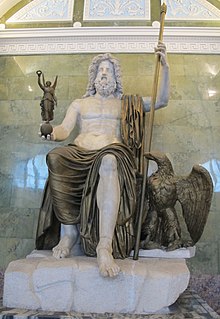Jupiter (god)
| Jupiter | |
|---|---|
| God of sky and lightning | |
| Member of the Archaic and Capitoline Triads | |

A marble statue of Jupiter from c. 100 AD
|
|
| Other names | Jove |
| Abode | Rome |
| Symbol | Lightning bolt, eagle |
| Consort | Juno |
| Parents | Saturn |
| Siblings | Roman tradition: Juno Greco-Roman: Pluto and Neptune |
| Children | Mars, Vulcan, Minerva, Hercules, Bellona, Mercury |
| Greek equivalent | Zeus |
Jupiter, also Jove (Latin: Iūpiter [ˈjuːpɪtɛr] or Iuppiter [ˈjʊppɪtɛr],gen. Iovis [ˈjɔwɪs]), is the god of sky and thunder and king of the gods in Ancient Roman religion and mythology. Jupiter was the chief deity of Roman state religion throughout the Republican and Imperial eras, until Christianity became the dominant religion of the Empire. In Roman mythology, he negotiates with Numa Pompilius, the second king of Rome, to establish principles of Roman religion such as offering, or sacrifice.
Jupiter is usually thought to have originated as a sky god. His identifying implement is the thunderbolt and his primary sacred animal is the eagle, which held precedence over other birds in the taking of auspices and became one of the most common symbols of the Roman army (see Aquila). The two emblems were often combined to represent the god in the form of an eagle holding in its claws a thunderbolt, frequently seen on Greek and Roman coins. As the sky-god, he was a divine witness to oaths, the sacred trust on which justice and good government depend. Many of his functions were focused on the Capitoline Hill, where the citadel was located. He was the chief deity of the early Capitoline Triad with Mars and Quirinus. In the later Capitoline Triad, he was the central guardian of the state with Juno and Minerva. His sacred tree was the oak.
...
Wikipedia
